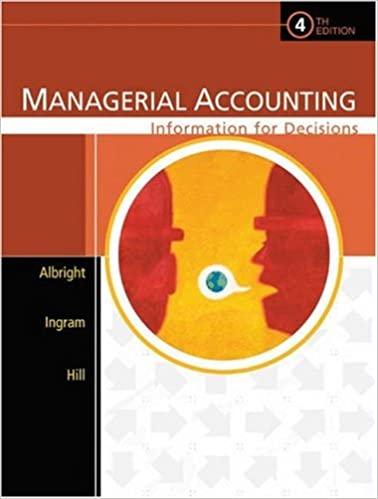1. Management accounting is concerned primarily with providing: a. information in accordance with generally accepted accounting principles....
Question:
1. Management accounting is concerned primarily with providing:
a. information in accordance with generally accepted accounting principles.
b. information to stockholders, creditors, and others outside the organization.
c. information to managers inside the organization.
d. information to regulatory agencies.
2. The managerial functions of planning, control, and decision making typically are:
a. approached in precisely the same way in every organization.
b. carried out simultaneously, with decision making being an inseparable part of the other functions.
c. carried out independently of one another, so that a function may be omitted without negative effects.
d. conducted only by the managers of manufacturing entities.
3. In decision making, a manager uses:
a. financial accounting information exclusively.
b. information from his or her department only, ignoring other departments' costs and activities.
c. information that must conform to generally accepted accounting principles.
d. information that is relevant to the decision even if the information does not conform to generally accepted accounting principles.
4. Daley is a stockholder of Public Company, Inc. In his role as a stockholder, Daley would most likely use:
a. managerial accounting information developed by the organization.
b. financial information contained in Public's annual report.
c. accounting information obtained directly from Public's computer system.
d. no accounting information about Public, since it is not available to outsiders.
5. Budgets are:
a. a form of planning for an organization's operating and financial matters.
b. concerned only with the company's cash position.
c. typically not prepared on an annual basis.
d. usually prepared for an organization as a whole, not for individual departments.
6. Management accounting in the beginning of the 21 st century would be most accurately described as a:
a. branch of financial accounting.
b. form of accounting that is concerned mainly with production-related managerial decisions.
c. form of accounting that is necessary if a business is to successfully compete in a global business environment.
d. branch of industrial technology.
7. The primary difference between a planning decision and a control decision is that:
a. investors make planning decisions, while management makes control decisions.
b. planning decisions involve dollars, while control decisions involve qualitative factors.
c. planning decisions involve revenues, while control decisions involve expenses.
d. planning decisions are developmental, while control decisions are corrective.
8. A difference between the information needs of top management and those of middle managers of a business is that:
a. top managers make planning decisions, while middle managers make control decisions.
b. top managers are concerned with profits, while middle managers are concerned with costs.
c. middle managers require more timely and detailed information than top managers.
d. middle managers require less accurate information than top managers.
9. Which of the following is a control decision?
a. Developing goals
b. Determining strategic objectives
c. Determining operational objectives
d. Measuring outcomes 10. The use of managerial accounting in service organizations:
a. is pointless, since service organizations produce no tangible product.
b. provides timely, relevant, and accurate information to managers.
c. occurs more than the use of managerial accounting in manufacturing companies.
d. is required by regulatory agencies.
Step by Step Answer:

Managerial Accounting Information For Decisions
ISBN: 9780324222432
4th Edition
Authors: Thomas L. Albright , Robert W. Ingram, John S. Hill





